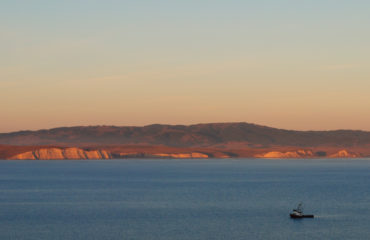The Fisheries Bill: What does it tell us about post-Brexit fisheries policy?

On Thursday 25 October, the government presented its much-anticipated Fisheries Bill to Parliament. While there was a perception that the development of post-Brexit fisheries policy had been stalled (the earlier Fisheries White Paper had been delayed by about a year), the publication of the bill means there is now a sense that things are moving. The bill marks the next step in the UK’s withdrawal from the EU’s Common Fisheries Policy, and has been welcomed by some in the UK fishing industry as an important milestone in the UK becoming an independent coastal state.
What does the bill do?
The bill is primarily about establishing a legal framework. This is one of several pieces of legislation which are required in addition to the EU Withdrawal Act to prevent there being a legal ‘governance gap’ after Brexit.
In this sense the Fisheries Bill isn’t, in and of itself, a new fisheries policy. Instead it sets up a framework for future fisheries policy to operate in and gives the UK the legal authority to exercise control in its Exclusive Economic Zone.
The bill itself is also subject to the usual parliamentary politics, which means it is likely to be amended as it works its way through both houses of parliament. That said, there are three key aspects to the bill.
What is in the bill?
Firstly, the bill sets out a series of key principles which will guide fisheries policy. These are: the sustainability objective, the precautionary objective, the ecosystem objective, the scientific evidence objective, the discards objective and the equal access objective. The sustainability objective in particular adopts a broad definition. This covers not only environmental sustainability, but also “the objectives of achieving economic, social and employment benefits, and of contributing to the availability of food supplies”. These aims are laudable and environmental groups have cautiously welcomed their inclusion in the bill, but questions remain over how they will work, and be enforced, in practice.
Secondly, the bill also formally removes the automatic right of EU fishing vessels to have equal access to UK waters. Foreign fishing vessels (EU or otherwise) wanting to fish inside the UK’s EEZ will now need a fishing licence.
Thirdly, the bill attempts to resolve some of the puzzles presented by devolution. Fisheries policy is a devolved area, meaning it falls under the responsibility of the devolved administrations in Northern Ireland, Scotland and Wales (and Defra in England). But it also relies on areas with fall under reserved UK powers, such as international engagement, and there is a general consensus that some sort of ‘common framework’ to ensure co-ordination across the UK will be required.
The bill proposes to achieve this through Joint Fisheries Statements, where the UK fisheries administrations jointly set out their policies for achieving the key objectives outlined above. The bill also sets out powers for the devolved administrations in a number of areas, including licensing and marine conservation. But it also sets out that fishing opportunities will be decided at the UK level (albeit in consultation with the devolved administrations). The devolved administrations have yet to respond to these provisions and so it remains to be seen whether they will be seen as acceptable.
So where do we stand with fisheries policy?
As noted, the bill’s main purpose is to set out a framework in which post-Brexit fisheries policy will operate. While it marks an important step in the repatriation of fisheries powers, it does not yet represent a new fisheries policy.
The government’s Fisheries White Paper, published earlier in the year, set out a number broad proposals and a future direction for fisheries policy. The White Paper was largely welcomed for emphasising a broad commitment to key environmental principles, such as fishing to sustainable levels and using scientific evidence to inform policy decisions it was also criticised for being vague and underdeveloped. The White Paper was presented as a consultation document and the government has since published a summary of the responses it received. Nevertheless, several important questions about the future of fisheries policy remain.
One of these revolves around the distribution of fishing opportunities between large and small vessels. One of the largest gripes of the small-scale fleet is that they don’t have a fair share of the UK’s fishing quota. Vessels 10 metres and under make up 78% of the UK’s fishing fleet, but only receive a small proportion of the UK’s quota. Indeed, a recent report highlighted how UK fishing quota is concentrated among a small group of wealthy owners. This was always within the UK’s power to address, but Brexit arguably presents an opportunity to rebalance this aspect of fisheries policy. However, to the disappointment of many, the White Paper proposed that the current allocation of the UK’s quota would remain fixed.
Secondly, the press release accompanying the publication of the fisheries bill restates the government’s preference for there to be a separation between trade negotiations and fisheries negotiations. This is in direct response to calls from the fishing industry for there to be “no sell out” – with it representing around only 0.05% of GDP, there is a fear that fishing will be traded off for other areas in the negation.
But a complete separation between fisheries and the wider Brexit deal is unrealistic. The need for frictionless trade with the EU is vital to the fishing industry, and the shell-fishing sector in particular is highly exposed to a no-deal Brexit scenario. Even if a formal separation between trade and fisheries could be achieved, there is a diplomatic angle that needs to be considered, as the EU (and other countries the UK wants to do deals with) will be looking at how the UK behaves in fisheries policy negations.
The continued statement that fishing and trade negotiations can be kept entirely separate therefore risks setting false expectations about what will be achieved. This will only serve to further alienate the fishing community when inevitably some compromise will need to be worked out.
Conclusions
Overall, then, the Fisheries Bill represents another step along the UK’s path to becoming an independent coastal state. But it’s not yet law, and the overall shape of post-Brexit fisheries policy remains uncertain.
The government’s task here isn’t enviable. An overwhelming majority of fishers voted to leave the EU due to the perceived failing of the Common Fisheries Policy. The government will have to show it can address their concerns, but also that it is meeting its pledge to deliver a ‘green Brexit’ and establish a world class fisheries management system. After all, ensuring the long-term sustainability of fish stocks and the economic prosperity of the fishing industry go hand in hand. Given the UK’s geography and the nature of its fishery, this environmentally sustainable approach to fisheries management can only be achieved if the UK is able to work effectively with neighbouring coastal states, including the EU.
About the author
Dr Christopher Huggins is a Senior Lecturer in Politics at the University of Suffolk. Photograph courtesy of Tim Hill.




